第一单元综合探究一《带着地图去旅行》
- 格式:doc
- 大小:44.00 KB
- 文档页数:2
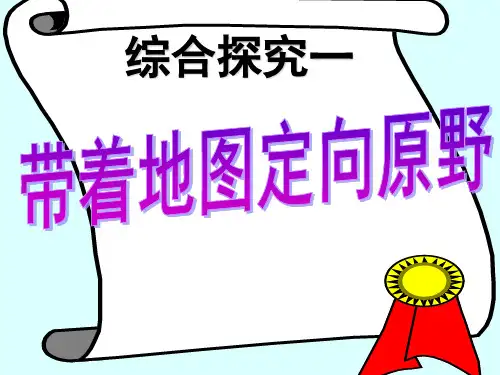
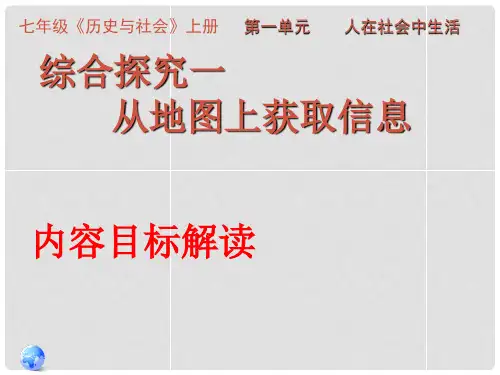

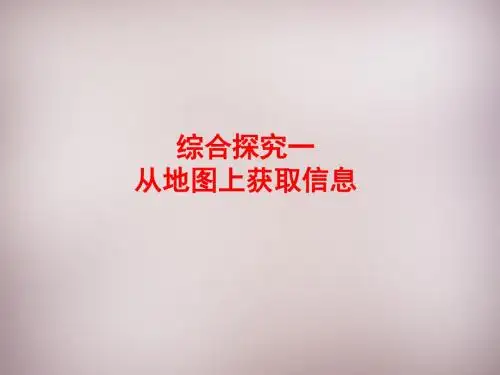
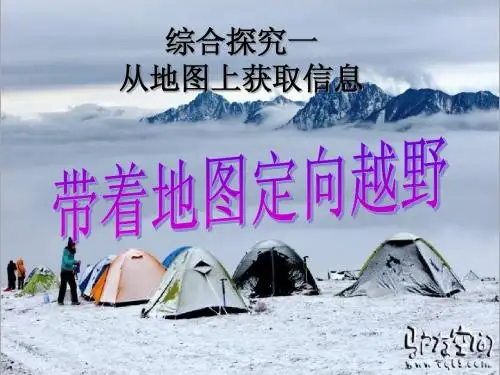
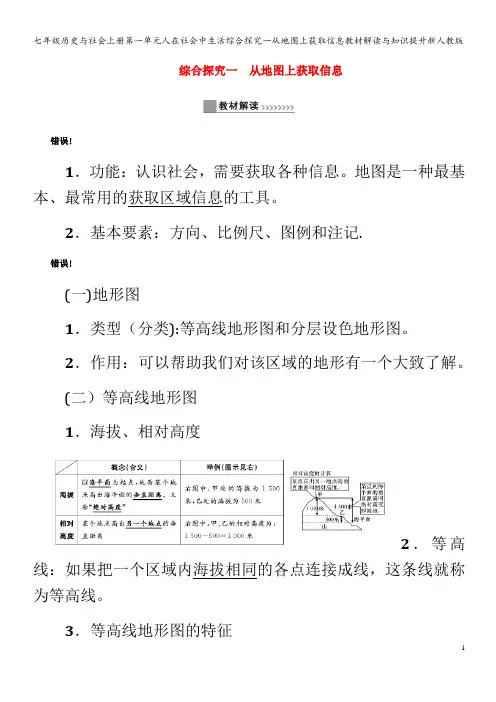
1 综合探究一 从地图上获取信息 错误! 1.功能:认识社会,需要获取各种信息。地图是一种最基本、最常用的获取区域信息的工具。 2.基本要素:方向、比例尺、图例和注记. 错误! (一)地形图
1.类型(分类):等高线地形图和分层设色地形图。 2.作用:可以帮助我们对该区域的地形有一个大致了解。 (二)等高线地形图 1.海拔、相对高度
2.等高线:如果把一个区域内海拔相同的各点连接成线,这条线就称为等高线。
3.等高线地形图的特征 2
(1)形状:等高线是一条封闭的曲线;同一条等高线上的所有点的海拔相等。 (2)疏密程度:在同一幅等高线地形图上,等高线稀疏的地方,表示地势起伏和缓(缓坡);等高线密集的地方,表示地势比较陡峭(陡坡)。
(3)形状特征(不同部位或地形的判断) ①山顶:等高线闭合,且数值从中心向四周逐渐降低(中间高,四周低)。(图5)
②盆地:等高线闭合,且数值从中心向四周逐渐升高(中间低,四周高)。 ③山脊:等高线向海拔低处凸出(注:如右下图中a处)。(图6)
④山谷:等高线向海拔高处凸出(注:河流在山谷发育而 3
成,如右下图中的B.C.d处)。(图7) ⑤鞍部:两个相邻山峰之间的低地,形似马鞍(注:如右下图中乙处)。(图8) ⑥陡崖:几条等高线重叠的地方(注:如右下图中甲处,多用锯齿状表示,攀岩应选择陡崖).(图9)
4.等高线地形图的判读 (1)判断地势高低:同一条等高线上各点的海拔相同,等高距在同一等高线地形图上是相等的;地势越高,数值越大;地势越低,数值越小.
(2)判断坡度的陡缓:在同一等高线地形图上,等高线越密集,坡度越陡,特别是山区,地图上的等高线非常密集;等高线越稀疏,坡度越缓。
(三)分层设色地形图(见课本附录《世界地形图》) 1.含义:在等高线地形图的基础上绘制,能够直观地告诉 4
我们地势的起伏状况。 2.特征:一般蓝色表示海洋,绿色表示平原,黄色表示高原或山地,褐色表示高山,白色表示雪线以上地区。
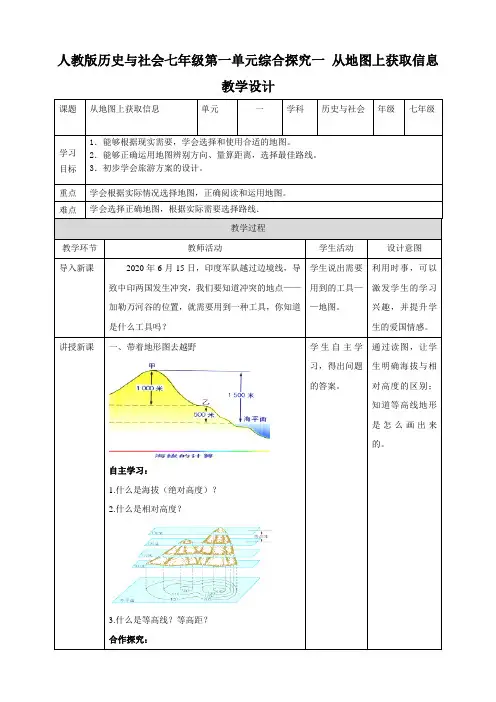
人教版历史与社会七年级第一单元综合探究一从地图上获取信息教学设计课题从地图上获取信息单元一学科历史与社会年级七年级学习目标1.能够根据现实需要,学会选择和使用合适的地图。
2.能够正确运用地图辨别方向、量算距离,选择最佳路线。
3.初步学会旅游方案的设计。
重点学会根据实际情况选择地图,正确阅读和运用地图。
难点学会选择正确地图,根据实际需要选择路线.教学过程教学环节教师活动学生活动设计意图导入新课2020年6月15日,印度军队越过边境线,导致中印两国发生冲突,我们要知道冲突的地点——加勒万河谷的位置,就需要用到一种工具,你知道是什么工具吗?学生说出需要用到的工具——地图。
利用时事,可以激发学生的学习兴趣,并提升学生的爱国情感。
讲授新课一、带着地形图去越野自主学习:1.什么是海拔(绝对高度)?2.什么是相对高度?3.什么是等高线?等高距?合作探究:学生自主学习,得出问题的答案。
通过读图,让学生明确海拔与相对高度的区别;知道等高线地形是怎么画出来的。
不同地形部位等高线的特点。
4.山顶与盆地的特点。
5.山脊与山谷的特点。
6.缓坡与陡坡的特点。
7.鞍部的特点。
自主学习:8.阅读课本P17——P18,找出什么是分层设色地形图,什么是地形剖面图。
二、带着地图去旅行自主学习:9.去厦门可以选择哪些地图。
组内交流探讨不同地形部位的特点。
阅读课本并找出问题的答案。
学生独立完成,或者同桌之间进行交流。
锻炼学生的思维能力和观察能力,培养学生的表达能力。
培养学生的阅读能力及读图能力。
培养学生分析问题的能力。
合作探究:10.比例尺大小的不同对地图有哪些影响。
11.从杭州到厦门可以选择哪些交通方式?比较各种交通方式的优劣选择最佳方式。
(考虑时间、花销、舒适程度)12.试一试:设计出从北京至杭州的最短铁路线。
自主学习:13.阅读课本P20,说说利用什么方式可以找到厦门大学。
合作探究:14.到了厦门,他该怎么去玩呢?请同学们帮陈天宇设计一个最佳的旅游方案?小组之内完成任务,不同小组之间也可以交换意见。
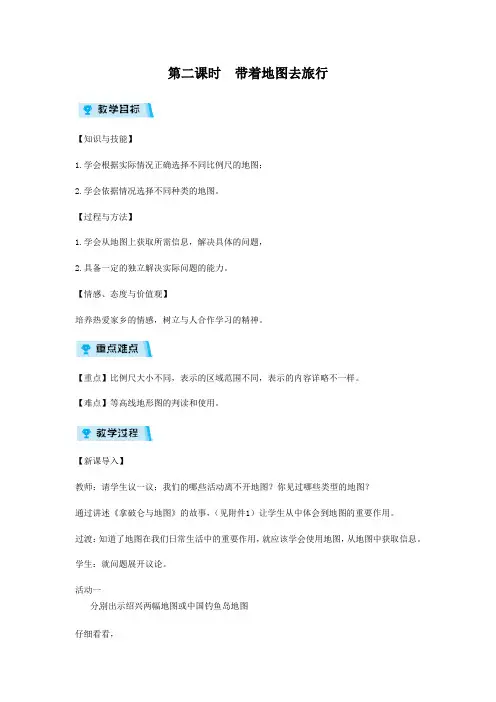
第二课时带着地图去旅行【知识与技能】1.学会根据实际情况正确选择不同比例尺的地图;2.学会依据情况选择不同种类的地图。
【过程与方法】1.学会从地图上获取所需信息,解决具体的问题,2.具备一定的独立解决实际问题的能力。
【情感、态度与价值观】培养热爱家乡的情感,树立与人合作学习的精神。
【重点】比例尺大小不同,表示的区域范围不同,表示的内容详略不一样。
【难点】等高线地形图的判读和使用。
【新课导入】教师:请学生议一议;我们的哪些活动离不开地图?你见过哪些类型的地图?通过讲述《拿破仑与地图》的故事,(见附件1)让学生从中体会到地图的重要作用。
过渡:知道了地图在我们日常生活中的重要作用,就应该学会使用地图,从地图中获取信息。
学生:就问题展开议论。
活动一分别出示绍兴两幅地图或中国钓鱼岛地图仔细看看,思考:哪一幅地图表示的范围大?两幅地图中内容的详细程度是否相同?为什么会出现这种情况?知识整合:引导学生发现,在图幅相同的地图中,表示的区域范围有大有小,内容有详有略,原因在于地图的比例尺大小不同。
归纳:比例尺越大,表示的实际空间范围越小,内容越详细。
比例尺越小,表示的实际空间范围越大,内容越粗略。
学生进行3分钟思考后就这三个问题进行抢答和老师一起整合知识,得出结论。
情境创设:“十一”长假,生活在浙江杭州陈天宇与父母要到福建的厦门旅游小组讨论策划活动二(1)根据老师提供的地图请学生以小组合作的形式进行讨论、策划,设计一份到厦门旅游的方案。
比比看哪个小组安排的路线最合适,走的重复路线最少(教师可在步骤上作适当的指导)。
(2)学生展示方案时,穿插一些问题。
如:为什么选择火车做交通工具?由杭州到厦门经过哪些铁路干线?是根据什么地图确定这条线路的?……小组代表展示活动方案。
情境创设:秋高气爽,游玩了秀丽的厦门后,陈天宇一家到家乡的大尖山走一走,看一看。
活动三(1)爬山该带什么地图?(2)怎么看等高线地形图?(讲清山峰、山谷、山脊、鞍部等识别)(3)Flash展示:地形图与等高线(4)根据登高线地形图请学生判断:从山麓到山顶怎样走最省力?怎样走最安全?怎样走最近?为什么?(5)怎么看分层设色地形图?(6)如何阅读地形剖面图?学生:就问题(2)做自由回答请学生总结本节课的收获。
第一课综合探究一《带着地图去旅行》教学设计(2012)
平湖市稚川实验中学 唐亚群 2012.9.5
一、【课标解读】:
课标:1-4-1认识地图三要素,知道地图的基本种类,运用地图获取所需要的地理信息。
解读:让学生掌握认识地图的基本方法,方向、比例尺、图例和注记等基本要素;知道地
图的基本种类,如何从地图中获取所需要的信息。
二、【教材简析】:
1.教材编写特点及意图:
阅读和使用地图学生认识社会,以及生活中不可或缺的基础知识和基本技能,也是学习历
史与社会课程必备工具之一。
教材图文配合,具体讲述不同地图能提供的不同信息,让学生学会从地图中获取相关信息,
结合生活实际需要选择合适的地图,学会运用比例尺计算实地距离,教材设计的模拟旅行方案,
层层推进。极大激发学生的学习兴趣。
2.教材结构体系:(最好有一张结构体系图或表)
带着地图去旅行---确定目的地的位置—选择适当的交通方式—确定从火车站到酒店的交
通方式和路线—设计游览路线
三、【教学目标】:
(一)知识与技能目标
1.能够根据现实需要,学会选择和使用合适的地图。
2.能够正确运用地图辨别方向、量算距离,选择最佳路线。
3.初步学会旅游方案的设计
(二)过程与方法
1.能从不同类型的地图上获取所需要的信息以解决实际问题;培养理论联系实际的能力。
2.模拟厦门旅游为活动线索设计教学过程,使课堂生活化。
(三)情感、态度和价值观
1.具备一定的独立解决问题的能力和与他人合作的精神。
2.参与调查活动,培养人文精神,增强主人翁意识。
四、【教学重点与难点】:
重点:1.学会根据实际情况选择地图,正确阅读和运用地图。
2.掌握重要的铁路干线,能够根据实际需要选择路线。
难点:学会选择正确地图,根据实际需要选择路线.
五【教学策略】:
1.主要采用案例教学法。创设民主、平等、和谐的教学氛围,让学生积极参与学习,教学
在潜移默化中进行。
2.描述法,融入生活元素,增强学生学习地理的兴趣,提高生活实践能力。
3.运用多媒体形象直观的展示手段,为呈现案例、案例分析、问题创设提供情境条件。
六、【教学过程设计】:
教学环节 过程设计
导入 多媒体展示厦门众多旅游景点风光图,问学生想不想去厦门旅游,
激发学生的兴趣。
环节一:厦门在哪里? 情境创设:厦门在哪里?——利用教材图1-35和图1-36。 教学方式: 首先让学生判断比例尺大小,范围的大小及内容详略程度,学会选择合适地图
引导学生探讨教材19页图片下面的问题,学会选择合适的地图,
了解厦门在杭州的方位,运用比例尺大致算出杭州到厦门的实际距离。
环节二:我要去厦门 情境创设:我要去厦门—— 教学方式:(先让学生说一说从杭州去厦门可以选择的方式有铁路、航空、水上交通、公路自驾游等及不同方式的优点及不足) 陈天宇最终选择火车,然后呈现《中国铁路交通干线图》了解中国
主要铁路线路
呈现中国东南沿海地区交通路线图。学会根据实际条件选择合适的
交通方式。
环节三:厦门我来了
情景创设:厦门我来了——呈现厦门城市交通图和百度搜索电子地
图。
教学方式:请学生上台来亲自操作演绎如何搜索电子地图,找到厦
门火车站到厦门大学的路线。介绍一下厦门大学的概况,激发学习斗
志。
也可以选用《厦门城市交通图》来自行设计路线,找到目的地。
环节四:学做小导游
情景创设:利用教材图1-40.
教学方式:请学生动手设计二日游或三日游的路线,学做小导游,
介绍旅游景点的风光,比一比赛一赛,看谁最具导游的天赋。
课堂小结
学生谈收获
课堂练习
导学稿课堂练习
拓展性学习作业
导学稿课后巩固练习
七、【板书设计】:
带着地图去旅行
厦门在哪里
带着地图去旅行
厦门我来了
学做小导游
参与者:毛满荣、吴平